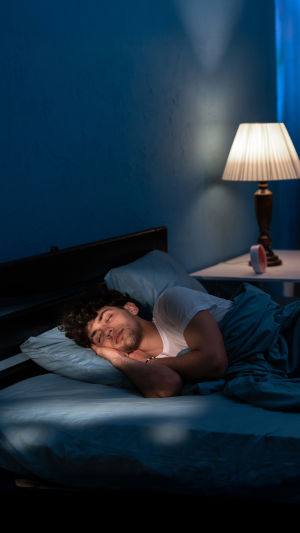You're lying in bed, doom-scrolling through your phone, telling yourself, "Just one more video." Then you glance at the clock—2:14 a.m. You finally force yourself to put the phone down, but you're wide awake. Sound familiar?
Many of us blame blue light for our late-night restlessness and screen-related eye strain. But is it really the villain? Or have we misunderstood how screen time affects our eyes and brain?
Let's break it down, using what science actually says.
<h3>What Is Blue Light, Really?</h3>
Blue light is a type of high-energy visible (HEV) light with a wavelength between about 400 and 490 nanometers. It's not some sinister invention of modern screens—blue light also comes from the sun, and quite a lot of it.
But here's the key: screens emit blue light constantly, especially LED-based screens like phones, tablets, and computers. And unlike the sun, we often stare directly into them—for hours—and long after it gets dark outside.
So, what's the impact?
<h3>The Melatonin Suppression Problem</h3>
Your body's internal clock (circadian rhythm) is influenced heavily by light. Specifically, blue light affects a hormone called melatonin, which tells your body it's time to sleep.
According to research published by Harvard Medical School:
"Blue light suppresses melatonin for about twice as long as green light and shifts circadian rhythms by twice as much."
In simple terms? Exposure to blue light at night can trick your brain into thinking it's still daytime, making it harder to fall asleep and reducing sleep quality.
That's why "Night Mode" or "Dark Mode" features have become popular—they aim to reduce blue light by shifting the screen toward warmer (yellow/red) tones after sunset.
But do these modes actually help?
<h3>Do Night Modes Really Work?</h3>
Surprisingly, not always. A 2021 study from Brigham Young University found that using night mode alone didn't significantly improve sleep compared to regular screen use. Why? Because the problem wasn't just the color of the light—it was the overall screen time and mental stimulation.
Scrolling through emails or social media before bed keeps your brain active, regardless of the light's color temperature.
That said, reducing blue light can still help—especially in combination with reducing usage time in the hour or two before bed.
<h3>What About Eye Strain?</h3>
If you've ever felt your eyes burning, dry, or tired after staring at a screen too long, you're not imagining it. But here's a twist: blue light may not be the main cause.
According to the American Academy of Ophthalmology (AAO):
"There is no scientific evidence that blue light from digital devices causes eye damage."
So why do our eyes feel strained?
<b>1. Blink rate drops dramatically when staring at screens.</b>
We normally blink about 15–20 times per minute, but that rate can fall by half during screen use. Less blinking = more dryness.
<b>2. Poor ergonomics and lighting.</b>
Staring at screens that are too close, too high, or too bright in dark rooms can add to discomfort.
<b>3. Prolonged focus without breaks.</b>
When we fixate on one distance for long periods, eye muscles get fatigued.
So while blue light contributes to discomfort indirectly, it's screen behavior—not just screen light—that's the main problem.
<h3>What Can You Actually Do?</h3>
If you're serious about protecting your eyes and your sleep, here are science-backed steps that actually work:
<b>1. Follow the 20-20-20 rule.</b>
Every 20 minutes, look at something 20 feet away for 20 seconds. This gives your eyes a much-needed reset.
<b>2. Lower screen brightness in the evening.</b>
This reduces overall light exposure, including blue light intensity. Consider using automatic dimming settings or blue light filters.
<b>3. Set a tech curfew—ideally 1–2 hours before bed.</b>
Even more than light, mental stimulation from scrolling is what keeps your brain wired. Switch to books, music, or quiet hobbies in the evening.
<b>4. Use artificial tear drops if your eyes feel dry.</b>
Especially in low-humidity indoor environments, they can help reduce screen-related dryness.
<b>5. Don't waste money on "blue light blocking" glasses—unless it helps you subjectively.</b>
Most experts, including the AAO, say the evidence for their benefit is weak. That said, if they help you reduce screen time or feel less strain, there's no harm in wearing them.
<h3>Bottom Line: Blue Light Isn't the Whole Story</h3>
Yes, blue light can disrupt melatonin and affect sleep—but it's just one piece of a larger puzzle. Screen fatigue and restlessness are just as much about how and when we use our devices as what kind of light they emit.
So, next time your eyes ache or you can't sleep, ask yourself: is it really the light, or is it the hours of endless scrolling and late-night group chats?
What's your experience with blue light or night mode? Have you made any changes that helped your sleep or eye comfort? Let us know—because let's face it, we're all trying to figure out how to live better with our screens.





